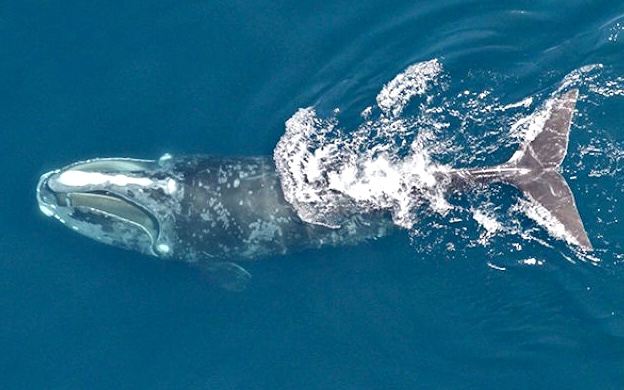Today, Oceana released a new report finding that most boats are speeding through slow zones designed to protect critically endangered North Atlantic right whales, of which only an estimated 340 remain in the world.
Oceana analyzed boat speeds from November 2020 through July 2022 in slow zones established by the National Oceanic and Atmospheric Administration (NOAA) along the U.S. East Coast and found that 84% of boats sped through mandatory slow zones, and 82% of boats sped through voluntary slow zones. This report, which provides an update from Oceana’s 2021 analysis, shows that stronger safeguards and increased enforcement are needed to save North Atlantic right whales from extinction.
Boat strikes are one of the top threats to North Atlantic right whales, which can cause death or injury from blunt-force trauma or propeller cuts. Studies have found that limiting boat speeds to 10 knots is estimated to reduce a North Atlantic right whale’s risk of death from being killed by a boat over 65 feet long by between 80% to 90%. While this report only analyzed boats 65 feet or larger, boats of all sizes can cause fatal injuries to right whales, as demonstrated in February 2021 when a 54-foot recreational boat struck and killed a calf. Current speed restrictions only apply to vessels 65 feet or larger, yet three of the four known vessel strikes of mother and calf pairs since 2020 have involved vessels between 35 to 65 feet.
“Boats are speeding, and whales are dying — it’s just that simple,” said Oceana Campaign Director Gib Brogan. “It’s clear that boats are still not abiding by the speed limits and are continuing to make the ocean a dangerous place for North Atlantic right whales. Time and time again we see what happens when speeding boats and right whales collide. Even one human-caused death is too many for this population to sustain. If NOAA wants to save this species from extinction, ships must slow down when these whales are present, and speeding boats must be held accountable. Time is of the essence before North Atlantic right whales reach the point of no return.”
In 2008, NOAA issued the Vessel Speed Rule that created two types of management tools to slow boats down to protect North Atlantic right whales from boat strikes: Seasonal Management Areas (SMAs) where North Atlantic right whales are expected to be present and Dynamic Management Areas (DMAs) triggered by whale sightings. DMAs suggest that ships avoid the area and have a voluntary speed limit of 10 knots. In contrast, SMAs require vessels to slow down to 10 knots. In 2020, NOAA Fisheries’ Greater Atlantic Regional Fisheries Office added a “Right Whale Slow Zone” program throughout New England and the Mid-Atlantic to provide additional protections. These voluntary zones function the same as DMAs, except they can also be triggered by acoustic detections.
Oceana’s analysis used data from Global Fishing Watch, an international nonprofit organization founded by Oceana in partnership with SkyTruth and Google. Oceana analyzed self-reported boat speeds and location data from November 1, 2020, to July 31, 2022, to track boat speeds and positions in SMA and DMA/Slow Zones.
Oceana’s analysis found that:
-
84% of vessels exceeded the speed limit (10 knots) in SMAs for both seasons.
-
An average of 86% of boats sped through the Ports of New York and New Jersey.
-
An average of 85% of boats sped through the area spanning from Wilmington, North Carolina, to Brunswick, Georgia.
-
An average of 74% of boats sped through calving and nursery grounds from Brunswick, Georgia, to northern Florida.
-
An average of 72% of boats sped at the entrance to the Chesapeake Bay.
-
An average of 66% of boats sped at the entrance to the Delaware Bay.
-
82% of boats ignored the recommended speed limit of 10 knots in DMA/Slow Zones.
-
An average of 82% of vessels ignored voluntary speed limits in the region spanning from Cape May, New Jersey, to central Atlantic Florida, in both seasons, making it the DMA/Slow Zone with the worst cooperation.
-
In each SMA, there were examples of ships traveling faster than 30 knots, at least three times the mandatory speed limit (10 knots).
-
In each DMA/Slow Zone, some ships traveled more than 37 knots, which was at least three and a half times the voluntary speed limit (10 knots).
-
Ships flagged to the United States, Panama, Marshall Islands, Liberia, and China had the most violations in SMAs. Ships flagged to the United States, Marshall Islands, Panama, and Liberia ignored voluntary speed limits in DMA/Slow Zones most often.
-
40% of the speeding ships were cargo vessels in both SMA and DMA/Slow Zones.
Oceana says that the current vessel speed regulations must also be improved in order to save this species from extinction. The organization is urgently calling on NOAA to immediately release its final updated Vessel Speed Rule (proposed in 2022) that would:
-
Update the timing and location of seasonal mandatory slow zones to reflect the current footprint of North Atlantic right whales compared to where the whales were 15 years ago;
-
Make compliance with voluntary Dynamic Management Areas mandatory; and
-
Expand the rule to include boats 35 feet or greater.
Additionally, Oceana recommends that NOAA strengthen the rule by:
-
Improving the monitoring, compliance, and enforcement of ship speeds in slow zones;
-
Narrowing the federal exemptions in the Vessel Speed Rule; and
-
Requiring boats 35 feet or greater to use Automatic Identification System (AIS) devices at all times.



